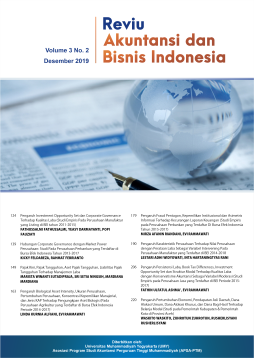Determinan Kinerja Lingkungan dan Kinerja Keuangan: Studi Empiris Perusahaan Non Finansial di Indonesia
DOI:
https://doi.org/10.18196/rabin.v6i1.12925Keywords:
Komite Audit, Ukuran Perusahaan, Kinerja Lingkungan, Kinerja KeuanganAbstract
Dalam dekade terakhir, perusahaan mengubah paradigm bisnis mereka. Perusahaan tidak lagi melihat lana sebagai orientasi utama namun mengalihkan fokus terhadap 3P yaitu Profit, People, dan Planet. Akibatnya, perusahaan memfokuskan keputusan strategis pada kinerja lingkungan. Perusahaan diharuskan meningkatkan kinerja keuangan tanpa mengabaikan kinerja lingkungan. Penelitian ini bertujuan untuk mengetahui pengaruh Komite audit dan Ukuran dewan terhadap kinerja lingkungan. Kedua, penelitian ini menganalisis pengaruh kinerja terhadap kinerja keuangan perusahaan. Penelitian ini menggunakan analisis regresi berganda. Populasi penelitian ini adalah seluruh perusahaan yang terdaftar di Bursa Efek Indonesia tahun 2018-2020. Sampel dipilih berdasarkan purposive sampling dengan kriteria sebagai berikut: perusahaan yang terdaftar di BEI selain bank dan lembaga keuangan dan menerbitkan laporan keuangan tahunan 2018-2020. Hasil penelitian dapat disimpulkan bahwa hipotesis 1 diterima dimana komite audit berpengaruh positif terhadap kinerja lingkungan dengan signifikansi 0,004. Pengujian pengaruh ukuran perusahaan terhadap kinerja lingkungan menunjukkan bahwa semakin besar perusahaan semakin baik kinerja lingkungan dengan signifikansi 0,002 sehingga hipotesis 2 diterima. Pengujian pengaruh kinerja lingkungan terhadap Kinerja Keuangan diperoleh signifikansi 0,027 sehingga hipotesis 3 diterima.References
Ahmed, H.A. (2015), The role of audit committee attributes in intellectual capital disclosures: Evidence from Malaysia. Managerial Auditing Journal, 30(8-9), 756-784.
Akbas, H.E. (2014), Company characteristics and environmental disclosure: An empirical investigation on companies listed on borsa istanbul 100 index. Journal of Accounting and Finance, 62, 145-164.
Akhtaruddin, M., Haron, H. (2010), Board ownership, audit committees’ effectiveness and corporate voluntary disclosures. Asian Review of Accounting, 18(1), 68-82.
Bagur-Femenı´as, L.A., Perramon, J.A. and Amat, O.B. (2015), “Impact of quality and environmental investment on business competitiveness and profitability in small service business: the case of travel agencies”, Total Quality Management and Business Excellence, Vol. 26 Nos 7/8, pp. 840-853.
Banasik, E., Barut, M., Kloot, L. (2010), Socially responsible investment: Labour standards and environmental, social and ethical disclosures within the SRI industry. Australian Accounting Review, 20(4), 387-399.
Barbu, E.M., Dumontier, P., Feleagă, N., Feleagă, L. (2014), Mandatory environmental disclosures by companies complying with IASs/ IFRSs: The cases of France, Germany, and the UK. The International Journal of Accounting, 49(2), 231-247.
Berliner, D. and Prakash, A. (2013), “Signaling environmental stewardship in the shadow of weak governance: the global diffusion of ISO 14001”, Law & Society Review, Vol. 47 No. 2, pp. 345-373.
Braam, G.J.M., de Weerd, L.U., Hauck, M., Huijbregts, M.A.J. (2016), Determinants of corporate environmental reporting: The importance of environmental performance and assurance. Journal of Cleaner Production, 129, 724-734.
Carini, C., Chiaf, E. (2015), The relationship between annual and sustainability, environmental and social reports. Corporate Ownership and Control, 13(1CONT9), 771-785.
Chang, K. and Zhang, L. (2015), “The effects of corporate ownership structure on environmental information disclosure-empirical evidence from unbalanced penal data in heavy-pollution industries in China”, WSEAS Transactions on Systems and Control, Vol. 10, pp. 405-414.
Dowling, J., Pfeffer, J. (1975), Organizational legitimacy: Social values and organizational behavior. The Pacifi Sociological Review, 18(1), 122-136.
Gantyowati, Evi & Nugroho, Dhinar Adi. 2009. “Pengaruh Komisaris Independen Dan Komite Audit Terhadap Pengurangan Asimetri Informasi Di Sekitar Pengumuman Laba.” Jurnal Siasat Bisnis, 13 (3); 253-265.
Garven, S. (2015), “The effects of board and audit committee characteristics on real earnings management: do boards and audit committees play a role in its promotion or constraint?”, Academy of Accounting and Financial Studies Journal, Vol. 19 No. 1, pp. 67-84.
Guthrie, J., Parker, L.D. (1989), Corporate social reporting: A rebuttal of legitimacy theory. Accounting and Business Research, 19(76), 343-352.
Hrovatin, N., Dolšak, N., Zorić, J. (2016), Factors impacting investments in energy effi iency and clean technologies: Empirical evidence from Slovenian manufacturing firms. Journal of Cleaner Production. DOI: 10.1016/j.jclepro.2016.04.039.
Kallamu, B.S., Saat, N.A.M. (2015), Audit committee attributes and firm performance: Evidence from Malaysian finance companies. Asian Review of Accounting, 23(3), 206-231
Miko, N.U. and Kamardin, H. (2015), “Impact of audit committee and audit quality on preventing earnings management in the pre- and Post-Nigerian corporate governance code 2011”, Procedia – Social and Behavioral Sciences, Vol. 172, pp. 651-657.
Muhammad, N., Scrimgeour, F., Reddy, K., Abidin, S. (2015), The relationship between environmental performance and financia performance in periods of growth and contraction: Evidence from Australian publicly listed companies. Journal of Cleaner Production, 102, 324-332.
Oba, V.C., Fodio, M.I. (2012), Board characteristics and the quality of environmental reporting in Nigeria. The Journal of Accounting and Management Corporate Governance in Nigeria, 2(2), 33-48.
Rao, Kathyayini, and Carol Tilt. 2016. “Board Diversity and CSR Reporting: An Australian Study.” Meditari Accountancy Research 24(2):182–210.
Samaha, K., Khlif, H., Hussainey, K. (2015), The impact of board and audit committee characteristics on voluntary disclosure: A metaanalysis. Journal of International Accounting, Auditing and Taxation, 24, 13-28.
Trotman, A.J.A. and Trotman, K.T.B. (2015), “Internal audit’s role in GHG emissions and energy reporting: evidence from audit committees, senior accountants, and internal auditors”, Auditing, Vol. 34 No. 1, pp. 199-230.
Walls, J.L. (2011), Measuring environmental strategy: development, reliability, and validity. Strategic Direction, 27(8), 71-114.
Downloads
Published
How to Cite
Issue
Section
License
Artikel ini dilisensikan di bawah Creative Commons Attribution 4.0 International (CC BY 4.0), yang mengizinkan penggunaan, distribusi, dan reproduksi dalam media apa pun, selama atribusi yang sesuai diberikan kepada penulis asli dan sumbernya.










